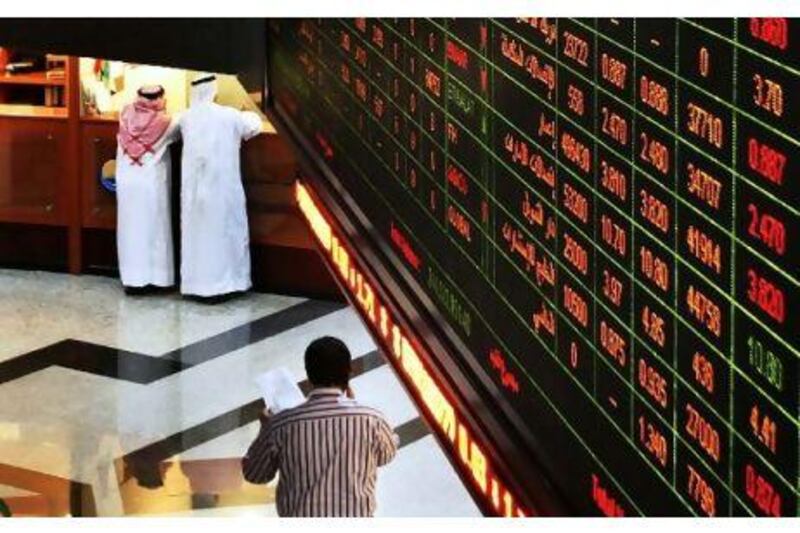A In a cramped room in the Abu Dhabi Securities Exchange (ADX), a surveillance team monitors six screens showing live data streams of all trading on the bourse.
The men are tasked with spotting illegal trades across the emirate, although they concede it is more difficult to apprehend perpetrators in a market culture that thrives on rumour and speculation.
Today, they study the trades of a trader from an international bank who bought several thousand shares of a company within a few hours.
The trades did not appear to be illegal but the surveillance team wanted to make sure the trader was not benefiting from inside information.
"We will look into it and make some calls," says one of the team members.
The electronic surveillance system, launched on the country's two main exchanges in Abu Dhabi and Dubai about six years ago, is part of the UAE's attempts to better regulate trading activity and curb market irregularities.
Last month, Riad Kamal, the chief executive of Arabtec Holding and one of the country's top businessmen, was banned from trading shares on UAE exchanges for six months by the country's regulator, the Emirates Securities and Commodities Authority (SCA). The SCA found he had sold more than 10 million shares in Arabtec a few days before the company announced two major projects.
The regulator banned Mr Kamal because he traded the stock during the 10 working-day period before the announcements, which is prohibited under market rules.
He has denied any wrongdoing and has said the proximity of his share sales to his company's contract announcements was coincidental.
Trading irregularities have been a problem for the country's three exchanges and the regulator alike, often because proving malpractice is difficult.
Speculative trading and market manipulation, experts say, is believed to be widespread in the Middle East; markets are dominated by retail investors, rather than large institutional traders, making it more difficult to track market irregularities or pick up insider trading.
Many investors rely on rumours picked up on blogs or sent by text messages rather than on market research, which some consider to be deficient in the region.
"If you can prove through material evidence that [a trader] acted on basis of [non-public] information, it's fine, but how easy is it to go to the court and prove that?" says an exchange official in the UAE, who wished to remain anonymous.
"Even in the US, how many people are caught? Not many and, even during the [financial] crisis, it was just five or six people and, 90 per cent of the time, the regulator loses because they settle it outside the court. It's very difficult," the official says.
In the ADX control room, a separate screen is dedicated to tracking traders referred to as "insiders". They could be top executives of listed companies, including chief executives or board members. Mr Kamal's trades were detected by this system.
Separately, industry experts have cast a sceptical eye on the regulator's authority and ability to prevent illegal trades.
"That the SCA was able to show teeth is worthy of encouraging remarks only if such remarks would go on to spur the regulator to take bolder action in the future and rein in what should otherwise be classed as market indiscipline," says Bode Wilfred, the head of corporate and capital markets at Galadari & Associates, a law firm in Dubai.
However, he says the SCA's ban on Mr Kamal does not go far enough as a deterrent.
"People participating in this recent incident in the UAE should consider themselves rather fortunate that the SCA has not gone as far as the Securities and Exchange Commission [SEC] in the US or the Financial Services Authority [FSA] in the UK," Mr Wilfred says.
The SEC has been behind some of the most high-profile arrests related to illicit deals in the US. Just three weeks ago, three technology company executives in the US were arrested for alleged insider trading.
The exact nature of penalties imposed by the SCA is hazy, however, although imprisonment can be imposed in some cases, according to the regulator's rules and regulations.
"There will always be loopholes, and the only thing you can do is minimise them. We are talking about a young market that will try to reach the level of mature markets; this will happen with time," says Fadi al Said, a fund manager at ING.
Alfred Fayek, the head of MENA equity sales at EFG-Hermes, says the nature of Middle Eastern markets is fundamentally different from those in the West.
"[Market malpractice] happens more in the Middle East because we use our emotions more," he said, adding that regional culture leads traders to want find out as much as possible about companies they deal with.
"But in the US, they know how to cover [illicit trading]," Mr Fayek says.
Some stock movements may be spurred by rumours, which is illegal according to stock market law. Whether the rumours are based on fact is another question. Electronic news services, brokerages and newspapers reported at least 1,875 rumours about potential buyouts of 717 companies between 2005 and last year, according to data compiled by Bloomberg. A total of 104, or 14.5 per cent, were then acquired, the data show.
It is not known how many traders have been banned in the Middle East, but experts agree that market irregularities continue to be part of the culture, and the responsibility lies with each country's regulator to tackle the issue.





